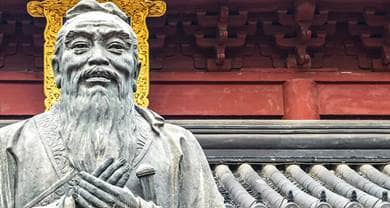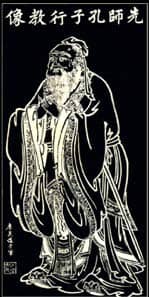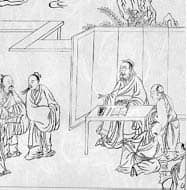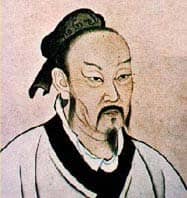- Trending:
- Pope Leo Xiv
- |
- Israel
- |
- Trump
- |
- Social Justice
- |
- Peace
- |
- Love

RELIGION LIBRARY
Confucianism
Beginnings
Confucianism is the term used to describe the family of traditions that are based on the teachings of Confucius (c. 551-479 B.C.E.), a Chinese thinker whose given name was Kong Qiu and whose disciples called him Kongzi ("Master Kong"). Kongzi's ideas became well known only after his death in the 5th century B.C.E. His 4th-century interpreter Mengzi (better known in the West as Mencius), Mengzi's 3rd-century critic Xunzi, and many others joined the debate about Confucian thought, adding their own ideas about human nature and morality, and considering practical applications, particularly to political rule and government.
 Kongzi's teachings are recorded in the text known as the Lunyu ("Analects"). According to Lunyu 7:1, Kongzi "transmitted, but did not innovate." What Kongzi claimed to transmit was the Tao ("Way"), a concept shared by all early Chinese thinkers, although perhaps most closely associated with Taoist traditions. For Kongzi, the Tao was that of the Western Zhou dynasty (1100-771 B.C.E.), which he idealized as an alternative to his own "Spring and Autumn Period" (770-481 B.C.E.), a time of increasing social disorder. Kongzi saw himself as a guardian of Western Zhou traditions that could still have value in his own time. He challenged his disciples, most of whom hoped to gain official positions with various feudal states, to emulate the sages of the past and restore the moral integrity of society. Most of his ideas, as described in the Lunyu, have to do with Tian ("Heaven," which the ancient Chinese regarded as a deity rather than as a destination in the afterlife), morality, and politics. These ideas, in turn, form the basis of what became Confucian thought. However, neither Kongzi nor his ideas were well known during his lifetime. His disciples and their followers, known as Ru (a term originally used to describe ritual specialists at early Chinese courts), preserved, expanded, and transmitted his teachings for several hundred years after his death despite being ignored or persecuted by various regimes, including the short-lived Qin dynasty (221-202 B.C.E.).
Kongzi's teachings are recorded in the text known as the Lunyu ("Analects"). According to Lunyu 7:1, Kongzi "transmitted, but did not innovate." What Kongzi claimed to transmit was the Tao ("Way"), a concept shared by all early Chinese thinkers, although perhaps most closely associated with Taoist traditions. For Kongzi, the Tao was that of the Western Zhou dynasty (1100-771 B.C.E.), which he idealized as an alternative to his own "Spring and Autumn Period" (770-481 B.C.E.), a time of increasing social disorder. Kongzi saw himself as a guardian of Western Zhou traditions that could still have value in his own time. He challenged his disciples, most of whom hoped to gain official positions with various feudal states, to emulate the sages of the past and restore the moral integrity of society. Most of his ideas, as described in the Lunyu, have to do with Tian ("Heaven," which the ancient Chinese regarded as a deity rather than as a destination in the afterlife), morality, and politics. These ideas, in turn, form the basis of what became Confucian thought. However, neither Kongzi nor his ideas were well known during his lifetime. His disciples and their followers, known as Ru (a term originally used to describe ritual specialists at early Chinese courts), preserved, expanded, and transmitted his teachings for several hundred years after his death despite being ignored or persecuted by various regimes, including the short-lived Qin dynasty (221-202 B.C.E.).
 The two most significant successors to Kongzi prior to the Han dynasty were Mengzi (c. 372-289 B.C.E.) and Xunzi (c. 310-220 B.C.E.). Although these thinkers disagreed about many key issues, especially human nature, they agreed on the primary issue of concern to most Confucians: how to restore and maintain social harmony. Both Mengzi and Kongzi pinned their hopes for society's renewal on the appearance of a sage-ruler who would combine political power with moral wisdom, unify the fractured empire, and usher in a new age of harmony and prosperity. According to Kongzi, "One who rules by morality may be compared to the North Star -- it occupies its place and all the stars pay homage to it" (Lunyu 2:1). For Mengzi, only a ruler who enjoyed the ming (moral mandate) of Tian could bring order to a state; if a ruler failed to do so, his subjects were entitled to rebel against him and replace him. Xunzi saw the ruler-subject relationship in familial terms, with the ruler as the all-powerful father entrusted with the care of his dependent subjects, who in turn benefited from his wise choices in matters of education policy and other cultural affairs.
The two most significant successors to Kongzi prior to the Han dynasty were Mengzi (c. 372-289 B.C.E.) and Xunzi (c. 310-220 B.C.E.). Although these thinkers disagreed about many key issues, especially human nature, they agreed on the primary issue of concern to most Confucians: how to restore and maintain social harmony. Both Mengzi and Kongzi pinned their hopes for society's renewal on the appearance of a sage-ruler who would combine political power with moral wisdom, unify the fractured empire, and usher in a new age of harmony and prosperity. According to Kongzi, "One who rules by morality may be compared to the North Star -- it occupies its place and all the stars pay homage to it" (Lunyu 2:1). For Mengzi, only a ruler who enjoyed the ming (moral mandate) of Tian could bring order to a state; if a ruler failed to do so, his subjects were entitled to rebel against him and replace him. Xunzi saw the ruler-subject relationship in familial terms, with the ruler as the all-powerful father entrusted with the care of his dependent subjects, who in turn benefited from his wise choices in matters of education policy and other cultural affairs.
 Early Confucian thought did not develop in isolation, but rather in dialogue with rival traditions. Every traditional school of Chinese thought except Buddhism has its roots in the "Hundred Schools" that flourished during the "Spring and Autumn" and "Warring States" (481-221 C.E.) periods between the fall of the Western Zhou dynasty and the rise of the Qin dynasty. Most "Hundred Schools" thinkers came from the class of newly-impoverished aristocrats known as shi ("knights" or "retainers") who lost their place in society due to the collapse of the Western Zhou social order. While Kongzi's disciples challenged rulers of feuding states to emulate the legendary sage-kings of the past and restore the moral integrity of the state, others were sharply critical of the Confucian vision.
Early Confucian thought did not develop in isolation, but rather in dialogue with rival traditions. Every traditional school of Chinese thought except Buddhism has its roots in the "Hundred Schools" that flourished during the "Spring and Autumn" and "Warring States" (481-221 C.E.) periods between the fall of the Western Zhou dynasty and the rise of the Qin dynasty. Most "Hundred Schools" thinkers came from the class of newly-impoverished aristocrats known as shi ("knights" or "retainers") who lost their place in society due to the collapse of the Western Zhou social order. While Kongzi's disciples challenged rulers of feuding states to emulate the legendary sage-kings of the past and restore the moral integrity of the state, others were sharply critical of the Confucian vision.
Probably the most powerful opponent of early Confucianism was the school of Mozi (c. 480-390 B.C.E.), who rejected the Confucians' antiquarian elitism and argued for the intrinsic moral value of all human beings, whom one ought to "love universally." Just as deeply at odds with Kongzi, but also with Mozi, was the thought of Yang Zhu, who taught that one should look out for oneself and not worry about anyone else. Also popular among Warring States intellectuals were the writings known as the Zhuangzi and Laozi (later given scriptural status within the Taoist tradition, in which it became known as the Daodejing), which rejected both Kongzi's moral conservatism and Mozi's social utopianism and advocated a quiet life of contemplation and survival in the midst of chaos.










